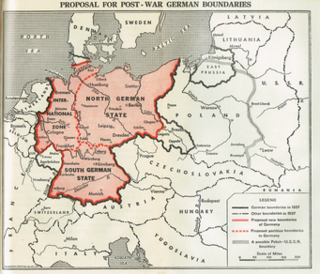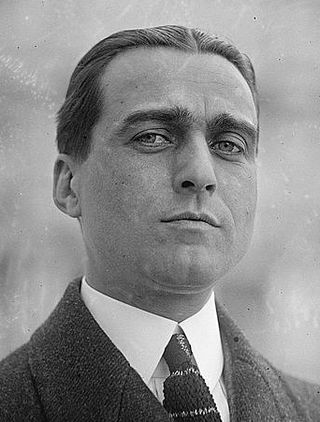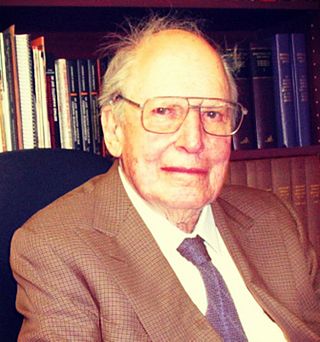
Cordell Hull was an American politician from Tennessee and the longest-serving U.S. Secretary of State, holding the position for 11 years (1933–1944) in the administration of President Franklin Delano Roosevelt during most of World War II. Before that appointment, Hull represented Tennessee for two years in the United States Senate and 22 years in the House of Representatives.

The Morgenthau Plan was a proposal to weaken Germany following World War II by eliminating its arms industry and removing or destroying other key industries basic to military strength. This included the removal or destruction of all industrial plants and equipment in the Ruhr. It was first proposed by United States Secretary of the Treasury Henry Morgenthau Jr. in a 1944 memorandum entitled Suggested Post-Surrender Program for Germany.

Henry Morgenthau Jr. was the United States Secretary of the Treasury during most of the administration of Franklin D. Roosevelt. He played a major role in designing and financing the New Deal. After 1937, while still in charge of the Treasury, he played the central role in financing United States participation in World War II. He also played an increasingly major role in shaping foreign policy, especially with respect to Lend-Lease, support for China, helping Jewish refugees, and proposing measures to deindustrialise Germany.

Stephen Samuel Wise was an early 20th-century American Reform rabbi and Zionist leader in the Progressive Era. Born in Budapest, he was an infant when his family immigrated to New York. He followed his father and grandfather in becoming a rabbi, serving in New York and in Portland, Oregon. Wise was also a founding member of the NAACP.

Stuart Elliott Eizenstat is an American diplomat and attorney. He served as the United States Ambassador to the European Union from 1993 to 1996 and as the United States Deputy Secretary of the Treasury from 1999 to 2001. For many years, and currently he has served as a partner and Senior Counsel at the Washington, D.C.–based law firm Covington & Burling and as a senior strategist at APCO Worldwide.
In the decades since the Holocaust, some national governments, international bodies and world leaders have been criticized for their failure to take appropriate action to save the millions of European Jews, Roma, and other victims of the Holocaust. Critics say that such intervention, particularly by the Allied governments, might have saved substantial numbers of people and could have been accomplished without the diversion of significant resources from the war effort.

Samuel Miller Breckinridge Long was an American diplomat and politician who served in the administrations of Woodrow Wilson and Franklin Delano Roosevelt. An extreme nativist, Long is largely remembered by Holocaust historians for making it difficult for European Jews to enter the United States during the 1930s and 1940s.

Franklin D. Roosevelt's relationship with Civil Rights was a complicated one. While he was popular among African Americans, Catholics and Jews, he has in retrospect received heavy criticism for the ethnic cleansing of Mexican Americans in the 1930s known as the Mexican Repatriation and his internment of Japanese Americans during the Second World War. From its creation under the National Housing Act of 1934 signed into law by Roosevelt, official Federal Housing Administration (FHA) property appraisal underwriting standards to qualify for mortgage insurance had a whites-only requirement excluding all racially mixed neighborhoods or white neighborhoods in proximity to black neighborhoods, and the FHA used its official mortgage insurance underwriting policy explicitly to prevent school desegregation.

The issue of why the Allies did not act on early reports of atrocities in the Auschwitz concentration camp by destroying it or its railways by air during World War II has been a subject of controversy since the late 1970s. Brought to public attention by a 1978 article from historian David Wyman, it has been described by Michael Berenbaum as "a moral question emblematic of the Allied response to the plight of the Jews during the Holocaust", and whether or not the Allies had the requisite knowledge and the technical capability to act continues to be explored by historians. The U.S. government followed the military's strong advice to always keep the defeat of Germany the paramount objective, and refused to tolerate outside civilian advice regarding alternative military operations. No major American Jewish organizations recommended bombing.
The Abandonment of the Jews: America and the Holocaust 1941–1945 is a 1984 nonfiction book by David S. Wyman, former Josiah DuBois professor of history at the University of Massachusetts Amherst. Wyman was the chairman of the David S. Wyman Institute for Holocaust Studies. The Abandonment of the Jews has been well received by most historians, and has won numerous prizes and widespread recognition, including a National Jewish Book Award, the Anisfield-Wolf Award, the Present Tense Literary Award, the Stuart Bernath Prize from the Society for Historians of American Foreign Relations, and the Theodore Saloutos Award of the Immigration History Society, and was nominated for the National Book Critics Circle Award."

James Clement Dunn was an American diplomat and a career employee of the United States Department of State. He served as the Ambassador of the United States to Italy, France, Spain, and Brazil. President Dwight Eisenhower characterized him as providing "exceptionally capable service".
The War Refugee Board, established by President Franklin D. Roosevelt in January 1944, was a U.S. executive agency to aid civilian victims of the Axis powers. The Board was, in the words of historian Rebecca Erbelding, "the only time in American history that the US government founded a non-military government agency to save the lives of civilians being murdered by a wartime enemy."

Arthur David Morse was an American author and television producer for the Columbia Broadcasting System (CBS) and a World War II historian. As a journalist, he worked both in print and television and concerned himself with investigating the social issues of his day. As an author, he is best known for While Six Million Died: A Chronicle of American Apathy (1968), his book concerning the inaction and disregard of the United States government, especially the State Department, for the genocide of the Jews of Europe during the Second World War.

Josiah Ellis DuBois Jr. was an American attorney at the U.S. Treasury Department who played a major role in exposing State Department obstruction efforts to provide American visas to Jews trying to escape Nazi Europe. In 1944, he wrote the Report to the Secretary on the Acquiescence of This Government in the Murder of the Jews, which led to the creation of the War Refugee Board. After the war, he was a prosecutor at the Nuremberg Trials prosecuting Nazi war crimes, particularly in the prosecution of Holocaust chemical manufacturer IG Farben.
Randolph Evernghim Paul (1890–1956) was a name partner of the international law firm of Paul, Weiss, Rifkind, Wharton & Garrison and was a lawyer specializing in tax law. He is credited as "an architect of the modern tax system."

Henry Morgenthau III was an American author and television producer, and scion of the Morgenthau dynasty and member of the Lehman family.
The presidency of Franklin D. Roosevelt began on March 4, 1933.
Joseph Charlap Hyman (1899 – February 10, 1949) was an American attorney, social worker, and philanthropist. He was born in New York, to Abraham Chaim Charlap, a member of the Sephardic rabbinical dynasty of Gedaliah ibn Yahya ben Joseph and a noted author and publisher of Hebrew texts and their English translations.
John W. Pehle was an American United States Department of the Treasury lawyer and one of the authors of the Report to the Secretary on the Acquiescence of This Government in the Murder of the Jews, a 1944 document exposing the United States Department of State's alleged cover-up of the Holocaust. As the first director of the War Refugee Board, Pehle helped save the lives of tens of thousands of European Jews who would have otherwise died at the hands of the Nazis in the last two years of the Second World War.

A neutral state, the United States entered the war on the Allied side in December 1941. The American government first became aware of the Holocaust in German-occupied Europe in 1942 and 1943. Following a report on the failure to assist the Jewish people by the Department of State, the War Refugee Board was created in 1944 to assist refugees from the Nazis. As one of the most powerful Allied states, the United States played a major role in the military defeat of Nazi Germany and the subsequent Nuremberg trials. The Holocaust saw increased awareness in the 1970s that instilled its prominence in the collective memory of the American people continuing to the present day. The United States has been criticized for taking insufficient action in response to the Jewish refugee crisis in the 1930s and the Holocaust during World War II.













